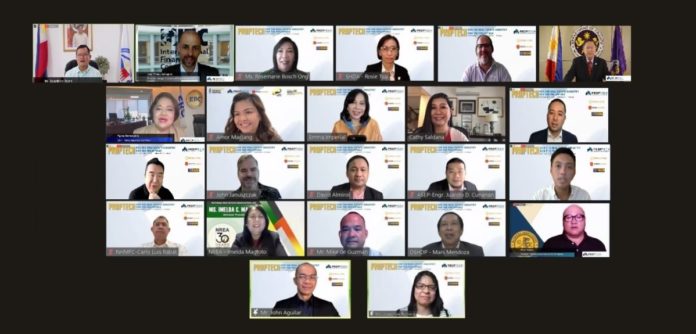The increase in digitalization and the rapid adoption of technology in property development will advance the industry, especially as digital solutions and platforms are becoming the norm in business. This forward-looking outlook was discussed during the launch of the PropTech Consortium of the Philippines which gathered experts in property, banking, government, energy, and technology. The digitalization of real estate and related sectors can also reduce the gap between the rich and the poor, and generate employment and business opportunities.
“The digitalization of the real estate industry will allow [the practitioners] to make processes more efficient, which will benefit the end-user of these developments…PropTech will be a great platform to achieve that, ” Carlos Dominguez III, Secretary of the Department of Finance (DOF), said during the digital event.
Secretary Eduardo Del Rosario from the Department of Human Settlements and Urban Development (DHSUD) also gave a preview as to why adoption of technology is vital to the development of the real estate industry: “Climate change is among the biggest challenges [that housing faces]. The Philippines is strengthening its efforts into environmentally-friendly [structures]. We need to promote efficient, affordable, and clean energy for more efficient energy consumption.”
Also represented and participating in the inaugural PropTech consortium were the Organization of Socialized Housing Developers of the Philippines, the Philippine Retailers Association (PRA), the Subdivision and Housing Developers Association (SHDA), the Philippine Solar and Storage Energy Alliance (PSSEA), the National Real Estate Association (NREA), the Association of Structural Engineers of the Philippines (ASEP), and FinTech Philippines Association (FTA).
Citing that the anticipated post-pandemic boom in real estate requires innovative solutions, Agnes Devanadera, chairperson of the Energy Regulation Commission (ERC), expressed that “…[W]ith PropTech all the leading companies and organizations that contribute to property development will be able to help each other in managing the emerging needs of this industry. We have seen the rise of the residential sector compared to the industrial and commercial sectors, and PropTech will allow us to better plan and tackle these set of new challenges and opportunities.”
While the current health situation has put more challenges in implementing innovation, the PropTech leaders still see the Philippines rising as a technology leader in Southeast Asia. Amor Maclang, co-founder of PropTech, pointed out that “by merging technology and real estate and other recent developments on finance, the Philippines is well-positioned to be a PropTech capital in Asia one sandbox, one experiment, one talk at a time.”
Other participants in the virtual event included Jean-Marc Arbogast, country manager of the International Finance Corporation; Marcelino Mendoza, chairman of the Organization of Socialized and Economic Housing Developers of the Philippines; Carlo Luis Rabat, president of the National Home Mortgage Finance Corporation; Sylvester Wong, vice president of Asia Pacific Cities (AECOM); Ricardo Lagdameo, president of Damosa Land; Raymond Rufino, chief executive officer of NEO; John Januszczak, president and CEO of UBX; and Dr. Justo Ortiz, vice chairman of the Union Bank of the Philippines.
Recognizing the present inequality in some industry processes that distinguish the affluent from the marginalized, Emma Imperial, PropTech’s chairperson and co-Founder, described one of the goals of the organization: “This consortium should unite in bringing the dividends of digitalization not only for the rich but also for the poor. As technology brings more transparency and speed, we could achieve more in making the real estate globally competitive.”
Anton Perdices, senior vice president and CEO of AboitizPower Distribution Utilities, also reiterated the need for a tech revolution in bringing sustainable solutions to the country. He said that, despite the immense challenges facing the industry, the digitalization of processes such as smart meters will lead to a “better understanding of the needs, perhaps in real-time, to be able to not only bring sustainable energy to the consumers but also tackle the challenges of climate change.”
Wick Veloso, president of the Bankers Association of the Philippines, expressed optimism in providing innovative solutions to potential home buyers: “In acquiring a new asset, finance is at the forefront of such decisions. As such the need to create more financing options for consumers will be handy in moving us forward and helping each and every Filipino to have their own investment by owning property.”
Cathy Saldaña, CEO and managing partner of PDP Architects, expressed the need to look ahead in utilizing emerging technologies because “this will help save cost and save time…the technology is already out there and we just have to be brave in implementing them in our design and for use in making regulations more efficient.” She reiterated, “PropTech is the future.”
One such emerging innovation is real estate tokenization wherein property is converted into trading digital assets on a blockchain. David Almirol, founder and CEO of Multisys Tech Corp., reiterated the vital role that tech and digital security play in developing customer relationships. He said, “There is a need to create a trust mindset based on security and transparency. Ultimately [and] in this way, we will be able to protect our consumers and boost confidence in what we can bring to them, whether it is about energy, technology, finance, or real estate.”
